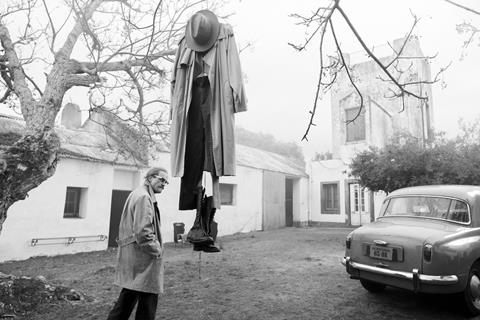
Kiril Serebrennikov’s ambitious biopic stars August Diehl as the Nazi commander of the horrific experiments at Auschwitz
As is well known, Josef Mengele was the physician and SS officer whose horrific experiments on prisoners at Auschwitz earned him the sobriquet “Angel of Death,.”
Based on the novel by Olivier Guez, The Disappearance of Josef Mengele displays an ambitious effort, a film that’s different from Serebrennikov’s previous features, such as Leto, Tchaikovsky’s Wife, and the biopic Limonov.
Unfolding as an espionage thriller, and shot almost entirely in black-and-white, The Disappearanmce is divided into three chapters, built around different pseudonyms of the fugitive Nazi.
The film tries to show events from the perspectiv of Mengele, as well as that of his adult son Rolf (Max Brettschneider), who visits his elderly father in Brazil, demanding the truth about his crimes.
Mengele’s travels include post-war visit to his family home in Germany, where, alongside with his father (Burghart Klaussner) and other Nazi loyalists.
In Argentina, Nazis flourish under the regime of the Perons. At a sumptuous country house, Mengele is celebrating his marriage to his former sister-in-law Martha (Frederike Becht).
Later, he is arrested and questioned for illicit medical practices in South America, and eventually hunted as a war criminal.
The extended penultimate section shows him living on a farm in Brazil with a Hungarian couple, Gitta (Annamaria Lang) and Geza Stammer (Thelio Werner), and continuing to disreagrd norms by ranting at the table, sleeping with Gitta, cursing the diet.
In its good moments, The Disappearance presents a rather restrained portrayal of a Nazi sociopath convinced that Hitker’s ideology makes him both normal and virtuous.
The women in Mengele’s life, including his first wife Irene (Dana Herfurth), fail to emerge as characters, with the exception of Gitta, who comes across as cynical and resentful.
There is an extended flashback in vivid color to Mengele’s activities in Auschwitz, a disturbingly graphic depiction of concentration camp atrocities. While the motive is to unveil the horrific reality of what Mengele depicts as “research for the benefit of a healthy Arian society,” the horror of these sequences feel excessive and intrusive.
Credits:
Directed, written by Kirill Serebrennikov, based on the novel by Olivier Guez
Cinematography: Vladyslav Opelyants
Production design: Vladyslav Ogay
Editor: Hansjörg Weissbrich
Music: Ilya Demutsky
Cast:
August Diehl, Max Brettschneider, Dana Herfurth, Frederike Becht
’










